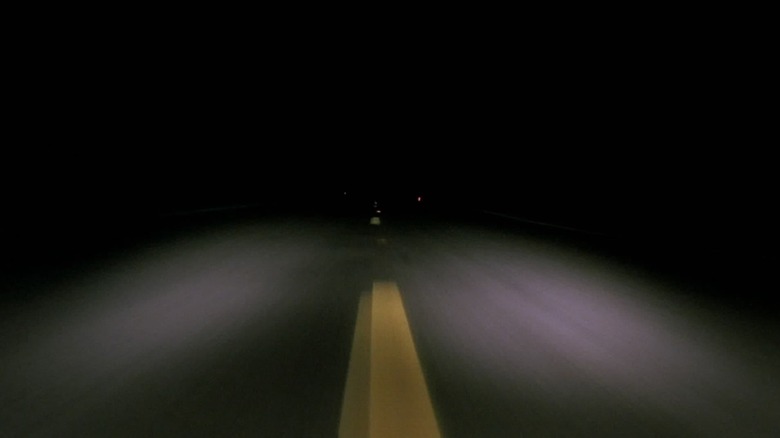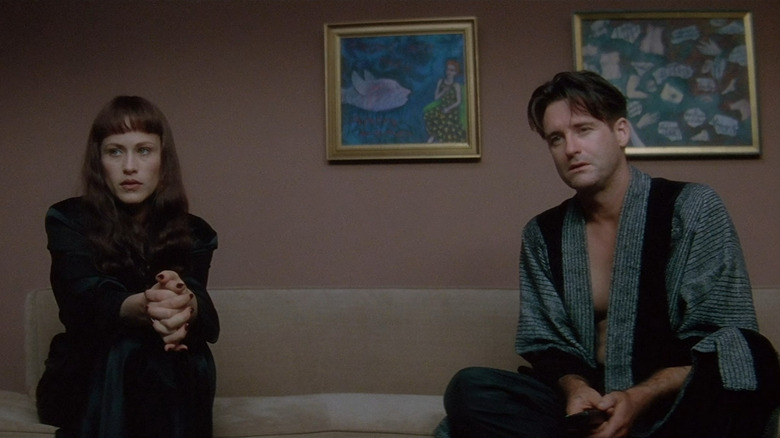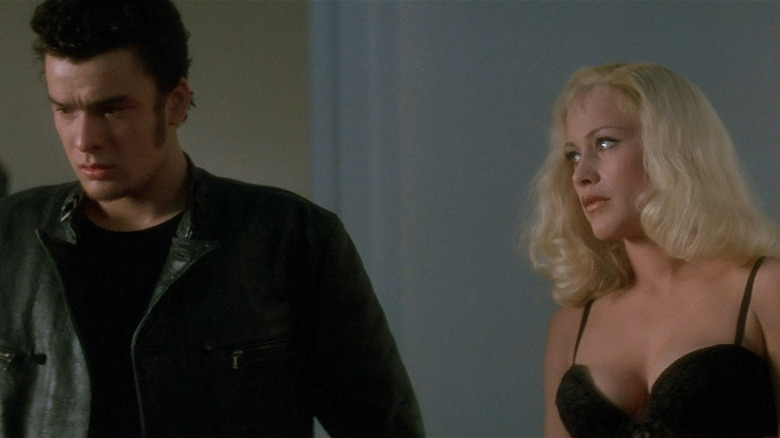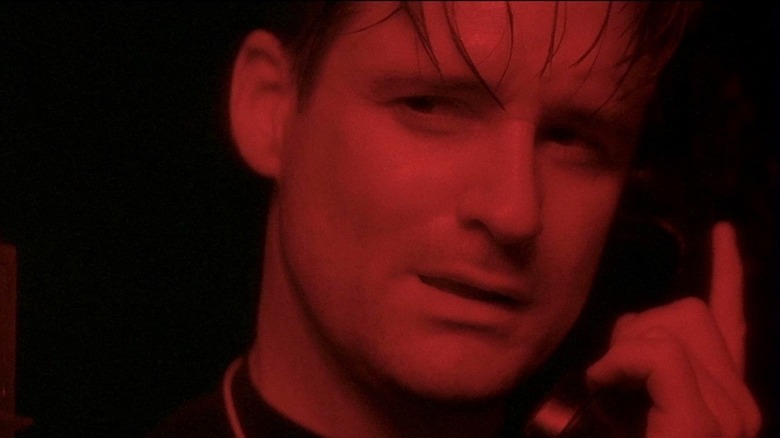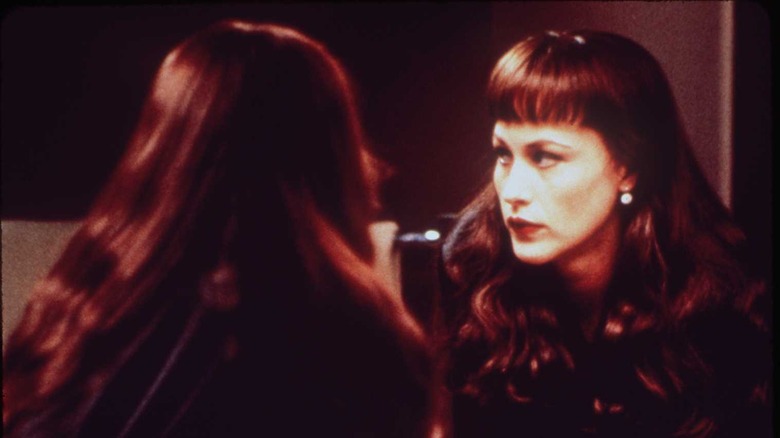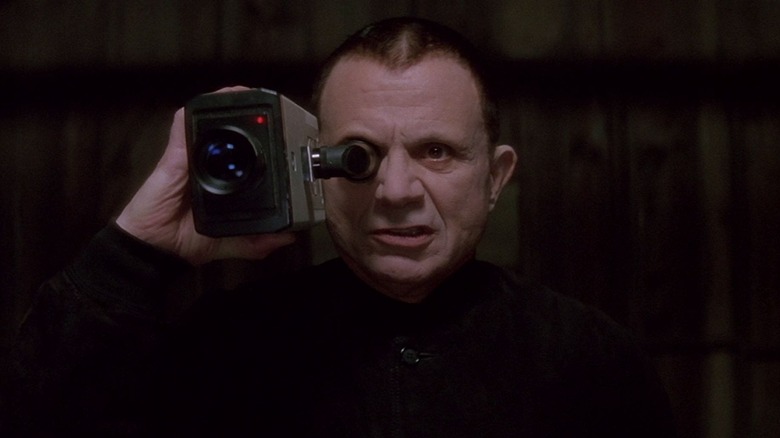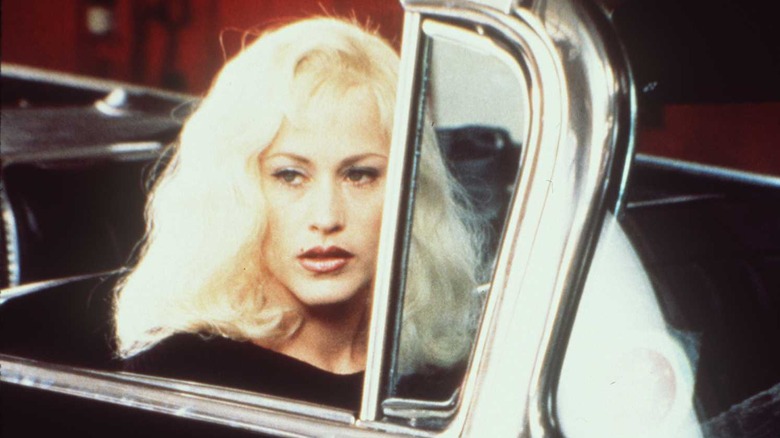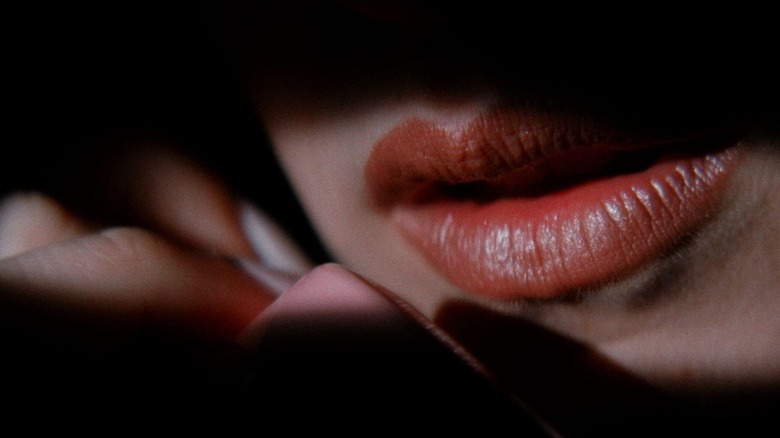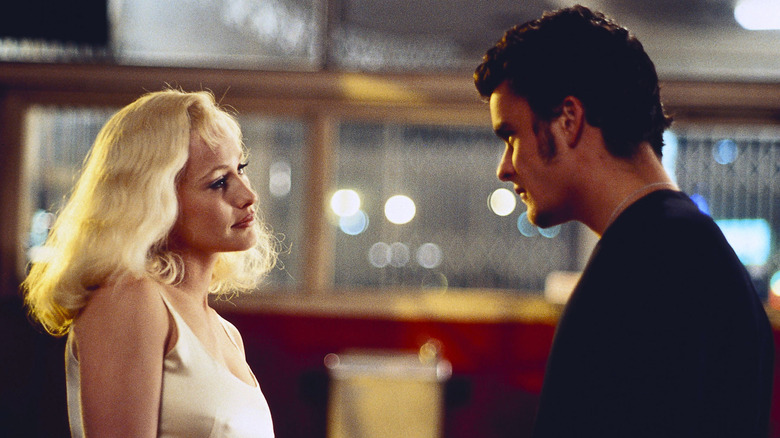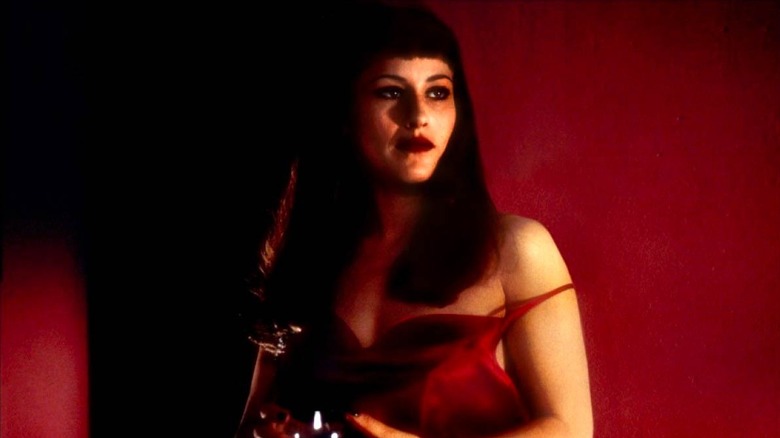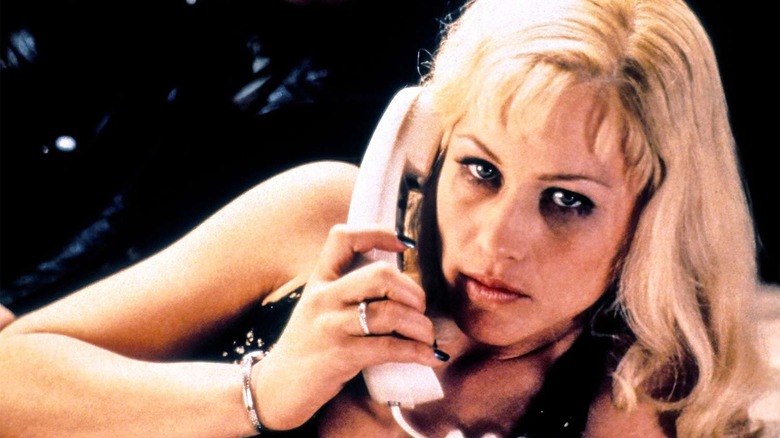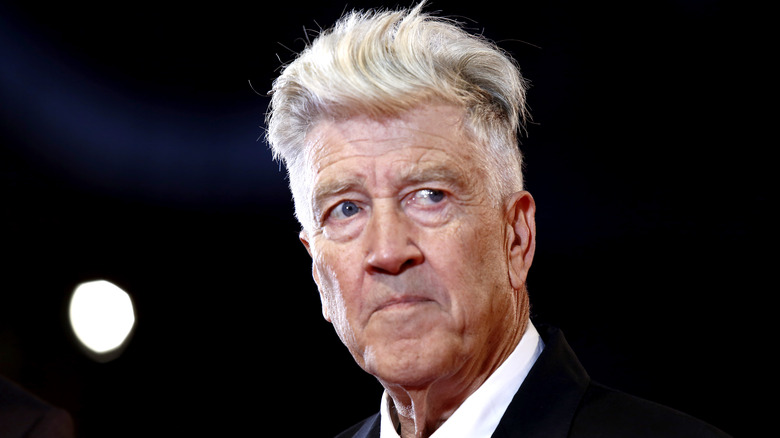The Ending Of Lost Highway Explained
David Lynch's death in 2025 at age 78 kicked off an outpouring of appreciation for the director's work, which had excited, enraged, and confounded audiences in equal measure. Lynch was that rarest of birds, an arthouse filmmaker who achieved mainstream success without compromising his singular vision. His best-known titles — the controversial "Blue Velvet," the practically flawless "Mulholland Drive," and the television-changing series "Twin Peaks" — were dark explorations of small-town America and the Hollywood dream factory, with mixtures of surreal imagery, cornball humor, and pop culture ephemera. While most of his films were showered with praise and accolades, others were dismissed upon their release, only to be reappraised years later. Perhaps no other Lynch film left audiences scratching their heads with as much frustration as "Lost Highway," a labyrinthine neo-noir about — to borrow from another famous movie title — sex, lies, and videotape.
"Lost Highway" was panned when it hit theaters in 1997, and Lynch famously used Siskel and Ebert's "Two Thumbs Down" vote on the posters. For many, the seedy exploration of perversion and multiple personalities was too confusing, an example of a director buying into his own hype and leaving the audience behind. And yet, almost three decades later, it's a fascinating distillation of the themes that obsessed Lynch throughout his career. To explain the plot of "Lost Highway" — especially the ending — may be an exercise in futility, but that won't stop us from trying. Strap in, dear reader — you're in for a ride.
What you need to remember about the plot of Lost Highway
The first half of "Lost Highway" centers on jazz saxophonist Fred Madison (Bill Pullman) and his wife, Renee (Patricia Arquette), who receive a strange message over their intercom telling them, "Dick Laurent is dead." The next morning, Renee finds a mysterious package containing a videotape of their house. When another tape of them sleeping in bed arrives, they call the police, who can't do much of anything. The couple attends a party in the Hollywood Hills held by Renee's friend, Andy (Michael Massee), where Fred encounters a strange man (Robert Blake) who claims to be inside their house at that very moment. Fred, of course, doesn't believe him, so the Man has the musician call him from a cell phone to prove it. That night, Fred receives a video showing him standing over Renee's mutilated body, which proves to be prophetic.
Fred is arrested for Renee's murder, and he starts having severe headaches while awaiting the electric chair. Then, something strange happens: Fred disappears and is replaced in his cell by mechanic Pete Dayton (Balthazar Getty), who's subsequently released because he hasn't committed any crime.
At his job, Pete repairs cars for Mr. Eddy (Robert Loggia), a gangster with a violent hatred for tailgaters, and falls in love with Mr. Eddy's girlfriend, Alice Wakefield (also played by Arquette), who claims that he's forced her into a life of pornography. Alice needs to get out of Los Angeles, and she convinces Pete to help her rob Andy and run away together.
What happens at the end of Lost Highway?
Alice's plan is simple: she'll distract Andy while Pete breaks in and collects his valuables. But Pete gets distracted when he enters the living room and sees a porno starring Alice projected on the wall. Andy finds an intruder in his home and launches into attack mode, inadvertently lodging his own head into a glass coffee table. Alice wants to run for it, but Pete is too distracted by a photo of her and Renee. He asks if they're the same person, and his nose starts bleeding. Pete searches for a bathroom, but suddenly finds himself in a motel hallway. He and Alice flee to a remote cabin, where they make love in front of the car headlights. Alice then tells Pete that he'll never have her before running off with the stolen goods.
With Alice gone, Pete reawakens as Fred and finds the Mystery Man waiting for him with a video camera. After Fred goes to the motel and finds Dick Laurent (Robert Loggia) having sex with Renee, he takes Dick back to the cabin and slits his throat. When Dick asks why, Fred and the Mystery Man show him a porno starring Renee. The Mystery Man shoots Dick in the head, and Fred returns to his house to deliver the message that "Dick Laurent is dead." The police show up, and Fred flees down the lost highway, his head spinning so wildly that it nearly explodes.
Are Fred and Pete the same person?
In developing "Lost Highway" with co-writer Barry Gifford (who wrote the novel on which "Wild at Heart" is based), David Lynch said that he had been inspired by the O.J. Simpson murder trial. "What struck me about O.J. Simpson was that he was able to smile and laugh," Lynch recounted in his book "Catching the Big Fish" (via CrimeReads). "I wondered how, if a person did these deeds, he could go on living." The way, Lynch found, was something called "psychogenic fugue," which he described as "an event where the mind tricks itself to escape some horror." "Lost Highway," Lynch said, was about this state of mind, as well as "the fact that nothing can stay hidden forever."
In metaphorical terms, Pete is a manifestation of Fred's inability to deal with his wife's murder. He can't come to grips with the fact that he might have killed Renee, so he disassociates to the point where he quite literally becomes a different person. But the other obvious reading of this is that Pete is representative of Fred's mid-life crisis.
In an early scene, Fred performs at a jazz club, blowing into his saxophone with a ferocity that doesn't exist in his marriage. This plays out in a later scene where Fred struggles to make love to Renee. The younger Pete, meanwhile, is juggling both a passionate affair with Alice and a hot relationship with his girlfriend, Sheila (Natasha Gregson Wagner). Freud would have a field day unpacking all of this.
Are Renee and Alice the same woman?
David Lynch's films often dealt with duality, most prominently in "Mulholland Drive" (possibly Lynch's best movie), in which a blonde starlet (Naomi Watts) and a brunette movie star (Laura Harring) meet, fall in love, switch identities, and seemingly merge into a single woman. "Lost Highway" plays in much of the same territory, with Patricia Arquette playing both the blonde Alice and the brunette Renee. This begs the question: are they the same woman? Are they different women? Or are they dual representations of the two most famous female archetypes in cinema — the femme fatale and the blonde bombshell? The answer is a little bit of all three.
When Renee is murdered and Fred transforms into Pete, Alice shows up. If Pete is a representation of Fred's younger self, then it stands to reason that Alice is a representation of his late wife, with whom he falls in love with all over again. Yet Alice is more dangerous than Renee, leading Pete down a path of crime and debauchery. When Alice leaves and Fred returns, the Mystery Man tells him, "There is no Alice. Only Renee."
That moment bears out when the police are investigating the crime scene at Andy's house and Alice has disappeared from the photo of her and Renee. They were once separate people, now merged into one, representing twin poles of the same personality. Is one a dream and the other reality? Well, yes and no, because ultimately they're both characters in a movie, so they're imaginary to begin with.
Who is the Mystery Man?
David Lynch is famous for his villains, from Frank Booth in "Blue Velvet" to Bob in "Twin Peaks." Yet few are as weird and terrifying as The Mystery Man in "Lost Highway," played by a pale-faced, eyebrow-shaved Robert Blake. There's an eerie level of verisimilitude to Blake's casting: a former child star who played mass killer Perry White in 1967's movie adaptation of "In Cold Blood," Blake became embroiled in a real-life murder case in 2001 when his wife, Bonny Lee Bakley, was shot to death while waiting in their car outside an Italian restaurant. Blake was arrested for the murder and pleaded not guilty, claiming that he had gone back to the restaurant to retrieve his own gun, which he'd left behind. Although he was acquitted of the murder charges, he was later found liable in a civil suit brought by Bakley's children.
Obviously, Lynch could never have predicted that Blake would become an infamous true crime figure when he cast him as the Mystery Man, yet his persona from "In Cold Blood" alone drives home the theme of his character here. On one level, the Mystery Man is a physical manifestation of the evil that lurks in the world: he isn't human, necessarily, so much as a demon from another world. But he's also a representation of our lurid fascination with death and perversion, which is encapsulated by him turning the camera on Fred in much the same way that the media trained cameras on O.J. Simpson.
How does Lost Highway connect with other David Lynch projects?
The most obvious analogue to "Lost Highway" in David Lynch's body of work is "Twin Peaks," which centers on a small town that's rocked by the murder of homecoming queen Laura Palmer (Sheryl Lee) by her father, Leland (Ray Wise). In that series and its spin-off film, "Fire Walk With Me," Leland Palmer is possessed by a demon named Bob (Frank Silva), who forces him to rape and kill his own daughter. He's driven to kill again when Laura's cousin, Maddy Ferguson (played again by Lee), shows up for the funeral, reminding him/Bob of his late daughter. (It should be no surprise that Laura is blonde and Maddy is brunette.) Leland has no memory of these crimes, and is driven to kill himself when he realizes what he's done. He shares many similarities with Fred Madison, who, after meeting the demonic Mystery Man, seemingly murders his wife and transforms into a totally different person to deal with his guilt.
"Lost Highway" shares parallels with Lynch's other LA-based noirs, "Mulholland Drive" and "Inland Empire," both of which deal with doppelgängers, multiple identities, and women in peril. All three films unfold using the narrative structure of dreams, where events proceed in a seemingly logical fashion before shattering and rearranging in a completely different order as we awaken. There is also, of course, the age-old idea of Hollywood as a land of broken dreams, a concept that fascinated Lynch as much as the small-town perversion of "Blue Velvet" and "Twin Peaks."
What the ending of Lost Highway means
David Lynch leaves it up to audiences to decipher what his films mean, and there are many ways to interpret the ending of "Lost Highway." On a literal level, the final act follows the classic patterns of every erotic thriller from "Double Indemnity" to "Body Heat" — a beautiful woman leads a naive man towards a violent act, only to leave him holding the murder weapon. Lynch's movie also seeks to explain what may have led Fred to murder Renee: seeing her experience passion in a pornographic film that she never experienced in their marriage. The entirety of Fred's arc can perhaps be easily explained as his reaction to his wife leaving him for another man, Dick Laurent.
Then there is the plot's circular, dreamlike structure, which begins with Fred getting a message that "Dick Laurent is dead" and ends with him delivering that very message to himself. Fred seems to be trapped in an endless loop, repeating the same events again and again, like some kind of nightmarish version of "Groundhog Day." The film's title is key; Fred is destined to travel the lost highway, doomed to repeat the mistakes of his past. This harkens back to another classic noir, "Detour," in which a sad sack jazz pianist (Tom Neal) finds himself entangled in a web of deceit and murder when he crosses paths with a venomous dame (Ann Savage) while hitchhiking to Los Angeles. The open road is a lonely place, and, as Lynch well knows, a dangerous one as well.
Another possible explanation of the ending
The ending of "Lost Highway" has inspired endless analysis, not just from critics and audiences, but from academics. In his book, "The Art of the Ridiculous Sublime," philosopher Slavoj Žižek deconstructed the plot as some sort of cinematic therapy session. "'Dick Laurent is dead,'" Žižek argued, is "a symptomatic key phrase" that "always returns as an insistent, traumatic, and indecipherable message." The film's plot is "a temporal loop, as with analysis, where the protagonist at first fails to encounter the self, but in the end is able to pronounce the symptom consciously as his own." In short, Fred Madison has experienced trauma, and the plot is him trying to get to the root of that.
But David Foster Wallace perhaps surmised the ending best for Premiere Magazine. What began as a piece of behind-the-scenes reportage morphed into a critical analysis of Lynch at a time when many thought he had lost his way after "Twin Peaks" reviled second season and its critically panned (at the time) prequel film, "Fire Walk With Me." On "Lost Highway's" final act, Foster wrote, "It's probably better not to give away much," but suffice it to say it was "by no means an 'upbeat' or 'feel-good' ending." And that's perhaps the only way to interpret it. If there is one common theme in Lynch's work, it's the idea that bad things happen in this world, and there is no explanation that will satisfy us as to why.
What did critics say about the ending?
"Lost Highway" was roundly criticized when it was released, with most of the ire directed towards its final act. Roger Ebert, who famously gave every David Lynch film thumbs down until "The Straight Story" and "Mulholland Drive," said watching it was "like kissing a mirror: You like what you see, but it's not much fun, and kind of cold." He found that "Hope is constantly fanned back to life throughout the story; we keep thinking maybe Lynch will somehow pull it off, until the shapeless final scenes, when we realize it really is all an empty stylistic facade. This movie is about design, not cinema." Mike Clark echoed these sentiments in USA Today, saying, "the movie does keep you going until the finale confirms suspicions that Lynch has painted himself into a corner."
Yet contemporary reassessment has been kinder. Reviewing the restoration in honor of its 25th anniversary, Richard Brody of The New Yorker called it "the director's purest exercise of style, yet it's nonetheless a highly personal entry in his canon." The movie's plot, Brody said, "is metafictional—a display of the exhilarations and delusions of a life like the director's own, one spent reprising this genre's lurid tales, fashions, and images"... an endless loop, if you will. Kevin Maher of The Times U.K. interpreted the film as being an examination of "the destructive psychic impact of killing on the killer. It's about madness, murder and the loss of self. Forget about vampires, zombies and the undead, this is true horror."
What has the cast and crew said about the ending?
When asked about her own interpretation of the film, Patricia Arquette told Variety that her character (or characters) was "a woman looked at through the distorted view of a psychotic misogynist." She further elaborated, "[Fred] hates women, he doesn't quite trust her, even though she is his wife. He kills her but can't remember it, then he recreates himself as this virile young man and meets her again. And now, she actually wants to f**k him and she is in love with him. But even in this version, she is a dirty whore." She added, "In this man's mind, a woman is always the monster. No matter what," hence why Alice turns on Pete and why Fred had to kill Renee.
In an interview with Film Threat, Barry Gifford likened the film's plot to a Möbius strip, which he described as "a long strip of paper curved initially into a circle, but with one end flipped over. The strip now has only one side that flips both inside and outside the shape." This structural understanding "made it easier to explain things to ourselves and [keep] it straightforward," Gifford said of the writing. "The story folds back underneath itself and continues."
What did David Lynch say about the ending?
David Lynch was always cagey when asked to explain his films, believing they spoke for themselves and that it was up to the viewer to interpret them. "It never will go back into words and be what the film is," the director once said of his intentions behind a movie (reported via RogerEbert.com). "Some films might have a theme, but even if it's a theme it might be a different thing for different people who see it. So, it's better to let people conjure up their own ideas, having seen and experienced the film."
Yet he opened the door slightly to explaining "Lost Highway" to Time Out. During the interview, Lynch slightly agreed with the notion that Fred Madison was trapped in an endless loop of repeating his past mistakes, saying, "Well, maybe not forever and ever, but you can see how it would be a struggle. Yeah, that's it." A famous meditator, Lynch also likened the plot to the Buddhist theory of reincarnation, explaining, "It's a fragment of the story. It's not so much a circle as like a spiral that comes around, the next loop a little bit higher than the one that precedes it." That was perhaps the best you could ever hope for from the famously elusive filmmaker, whose work continues to inspire arguments and reinterpretations to this day.
